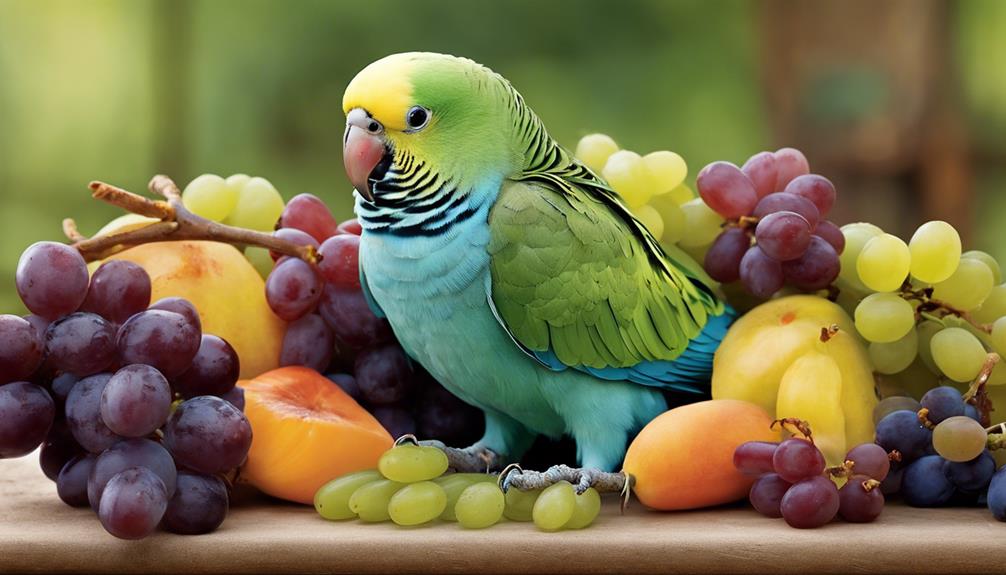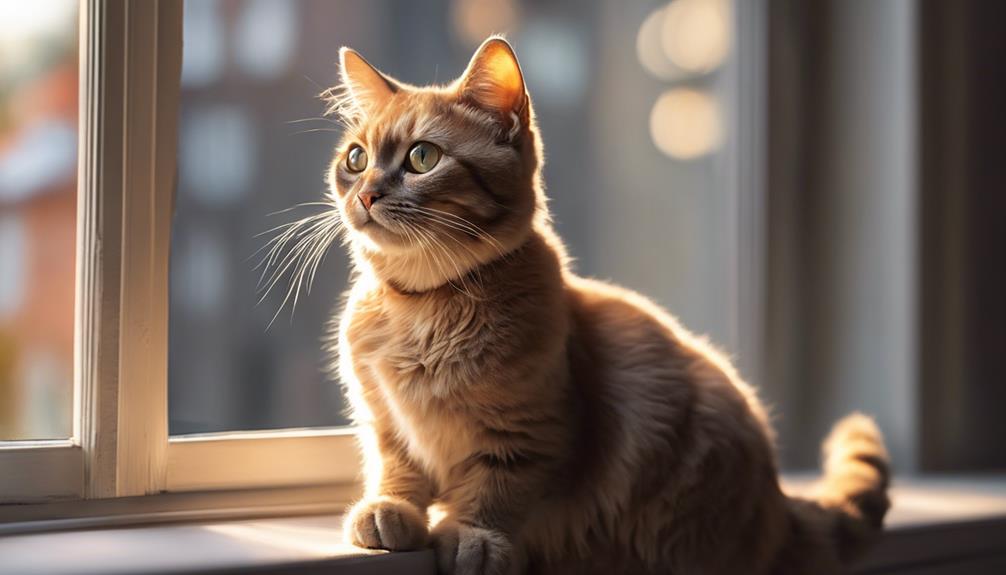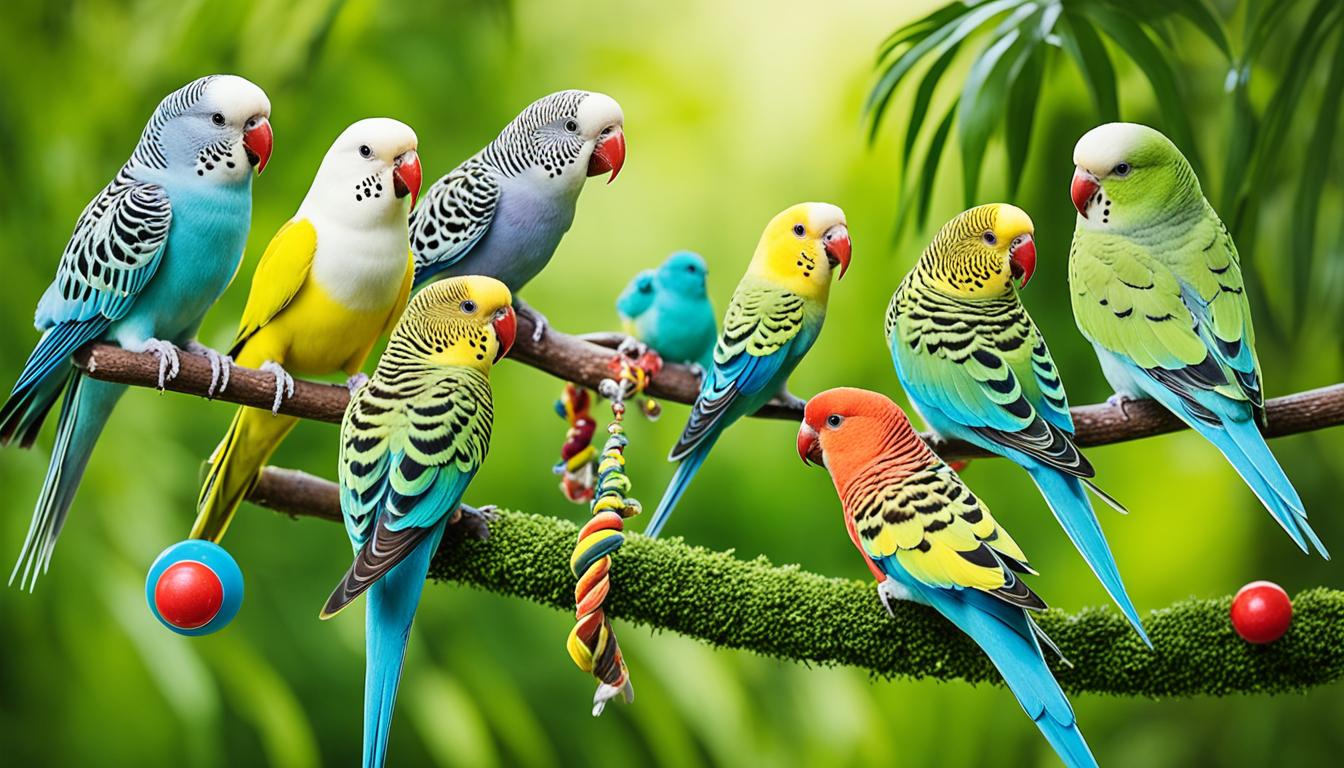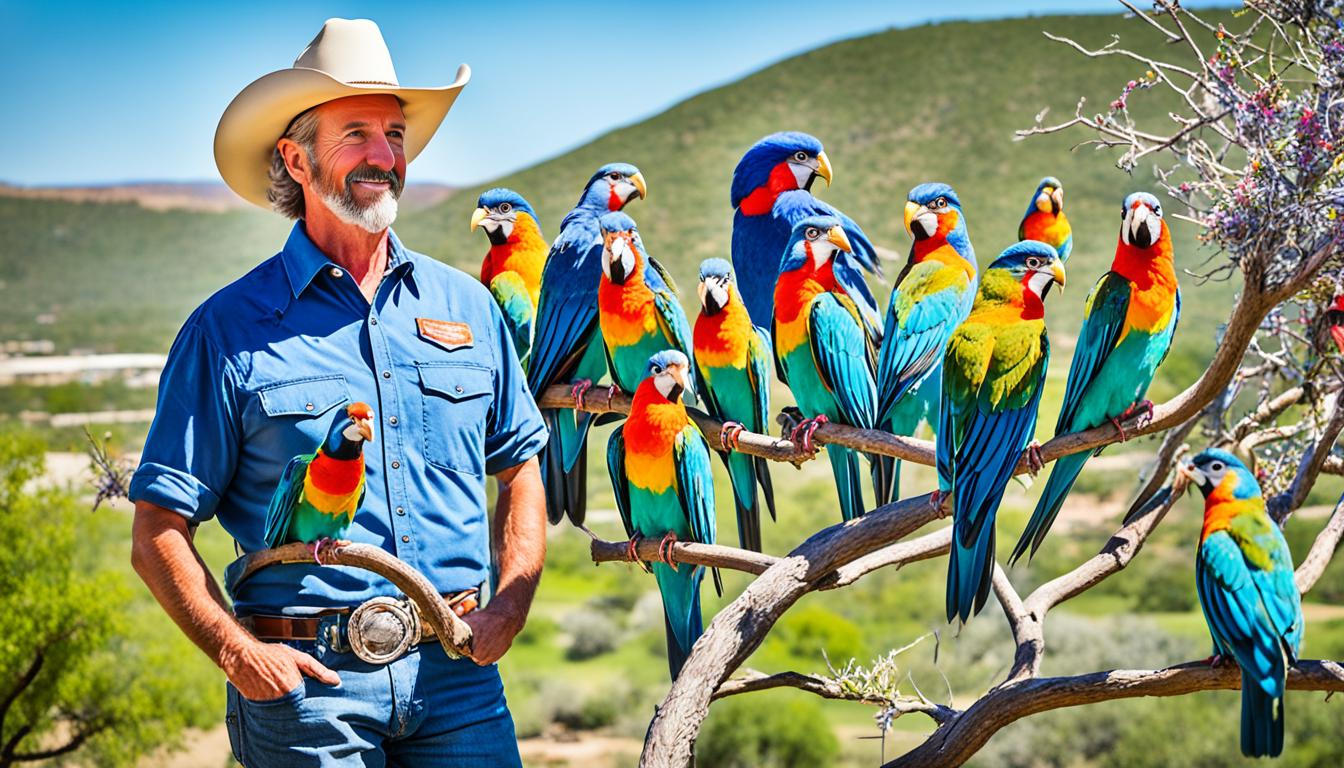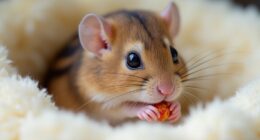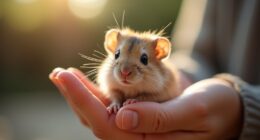We have discovered that parakeets can safely eat grapes by taking the following precautions: choose seedless grapes to avoid choking hazards, thoroughly wash grapes to remove any residues, and cut them into small pieces for easy consumption. It is crucial to select organic, seedless grapes to ensure safety and offer important nutrients such as potassium, vitamin A, and vitamin C.
Monitoring grape intake and offering them in moderation is key to maintaining a balanced diet for your parakeet. If you follow these steps, your feathered friend can benefit from this treat while staying healthy and happy.
Key Takeaways
- Wash grapes thoroughly to remove pesticides and chemicals.
- Cut grapes into small, manageable pieces to prevent choking hazards.
- Opt for organic and seedless grapes for safety and enjoyment.
- Serve grapes in moderation as part of a balanced diet.
- Monitor grape intake to prevent overconsumption and ensure parakeet health.
Grapes: Safe for Parakeets?
Grapes are considered a safe and nutritious treat for parakeets when provided in moderation. These small fruits are packed with essential nutrients like potassium, manganese, and vitamins A and C, making them a healthy addition to a parakeet's diet. While parakeets can consume grapes with seeds, opting for seedless grapes is preferable as they're easier to eat and reduce the risk of choking hazards. Additionally, selecting organic and seedless grapes can minimize exposure to pesticides, promoting overall bird health.
Incorporating grapes in a parakeet's diet provides a variety that can help prevent nutrient deficiencies. When offering grapes to your budgie, make sure they're chopped or sliced into small, manageable pieces to facilitate consumption. By including these fruits into their meals, you can offer your parakeet a diverse and balanced diet that supports their well-being. Remember, moderation is key when feeding grapes to parakeets to maintain a healthy and happy feathered friend.
Preparing Grapes for Your Bird
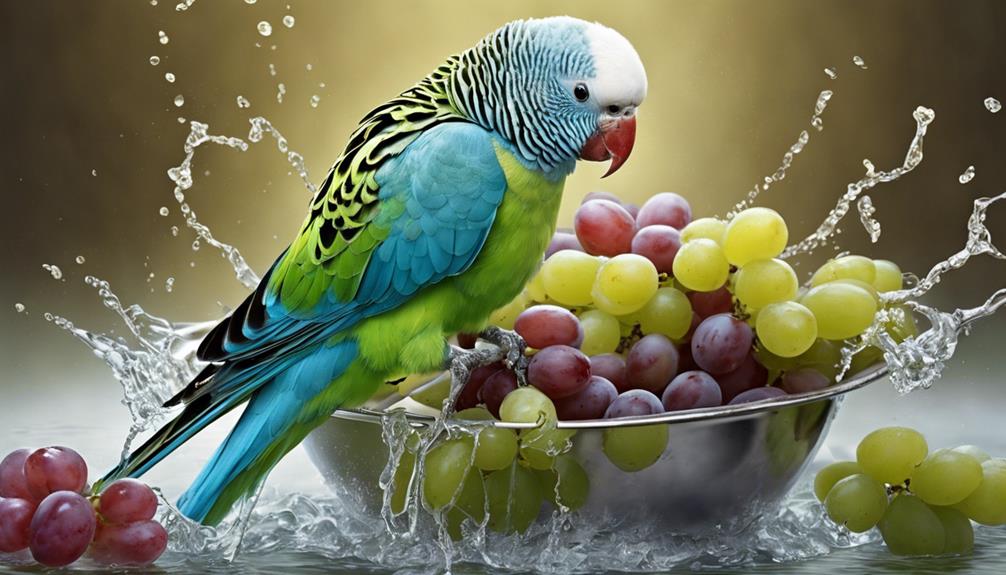
When preparing grapes for your parakeet, it is important to wash them thoroughly to remove any pesticides or chemicals that may be present. This step guarantees that the grapes are safe for your bird to consume. Additionally, cutting the grapes into smaller pieces can make it easier for your parakeet to eat and reduces the risk of choking. Providing your bird with organic and seedless grapes is ideal for their health and enjoyment. Below is a table highlighting some key points for preparing grapes for your parakeet:
| Preparation Tips for Parakeet Grapes | |
|---|---|
| Wash grapes thoroughly | Removes pesticides and chemicals |
| Cut grapes into smaller pieces | Reduces choking hazards |
| Offer organic and seedless grapes | Safer and more enjoyable for your bird |
Serving Grapes to Parakeets
To serve parakeets grapes safely and effectively, it's important to ensure that the fruit is offered in moderation as part of a balanced diet. When feeding grapes to budgies, it's essential to take into account their diet as a whole, ensuring that these fruits are a healthy addition rather than a primary component.
Here are some key points to keep in mind when serving grapes to parakeets:
- Seedless Grapes: Opt for seedless grapes to prevent any potential harm from grape seeds.
- Small Pieces: Cut grapes into small, manageable pieces to prevent choking hazards for your feathered friends.
- Washed Thoroughly: Always wash grapes thoroughly to eliminate any traces of chemicals or pesticides that could be harmful to parakeets.
Nutritional Benefits of Grapes
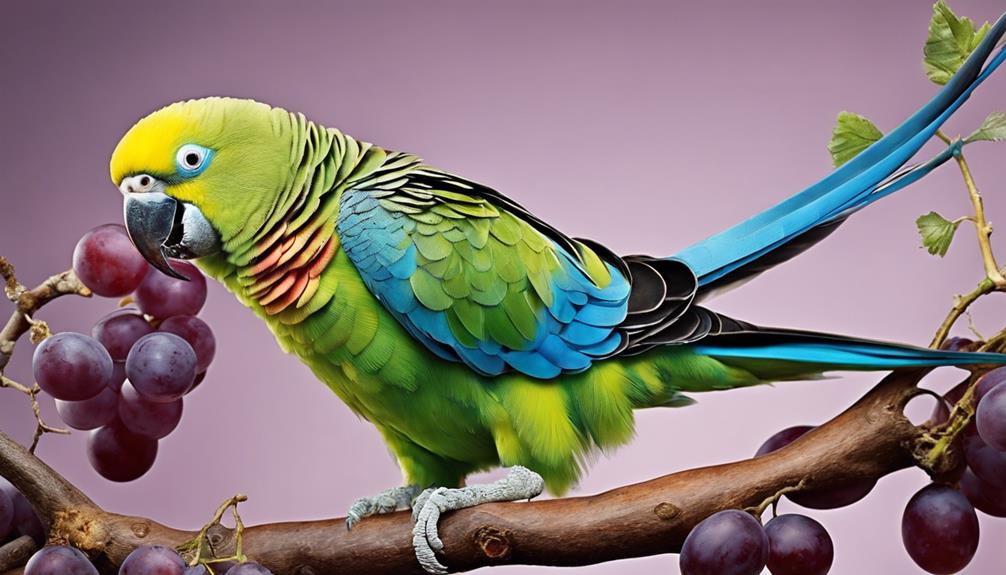
Considering the importance of maintaining a well-rounded diet for parakeets, exploring the nutritional benefits of certain fruits like grapes becomes imperative. Grapes are packed with essential nutrients like potassium, manganese, and vitamins A and C, all of which are highly beneficial for our feathered friends. Potassium plays an important role in supporting heart function in birds, while manganese contributes to maintaining healthy bones. Additionally, the vitamins A and C found in grapes help boost the immune system and promote feather health in parakeets.
The hydration and energy provided by grapes make them a valuable addition to a balanced diet for parakeets. However, it's crucial to remember that moderation is key when it comes to grape consumption. Excessive intake of grapes, especially due to their higher sugar content, can lead to weight gain and potential health problems in parakeets with sensitive digestive systems. Opting for fresh fruits over dried fruits can provide the necessary minerals without the risks associated with concentrated sugars. Understanding the nutritional benefits of grapes helps in ensuring the overall well-being of our beloved feathered companions.
Monitoring Grape Intake for Parakeets
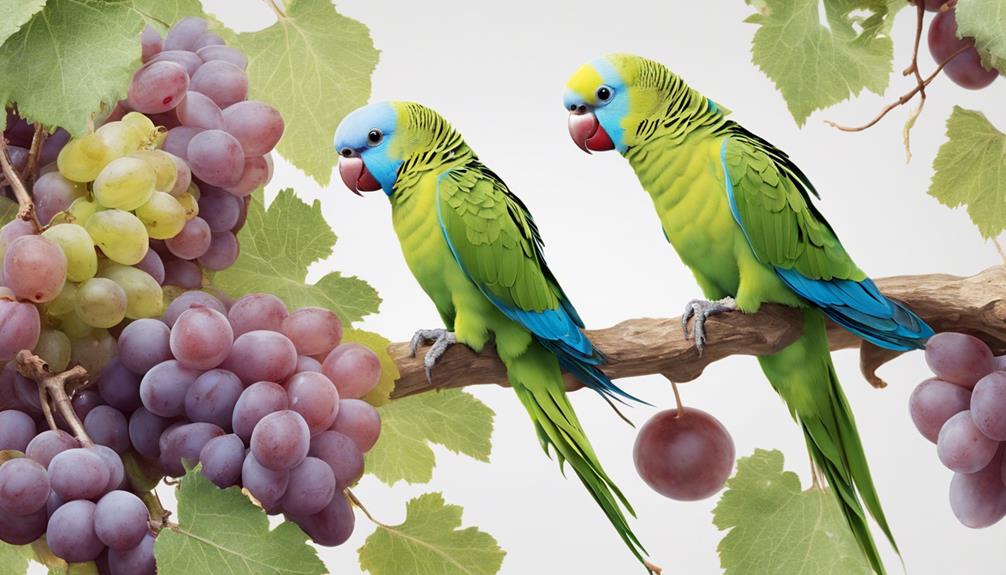
Monitoring the grape intake of parakeets is essential for maintaining their health and well-being. As a pet bird owner, ensuring your budgie's grape consumption is important. When offering one or two grapes per week as Fruit Treats, it's important to be mindful of potential risks associated with dried grapes or raisins, which can be mildly toxic to parakeets. To keep your feathered friend safe and healthy, remember these key points:
- Offering one or two grapes per week: Limiting the number of grapes prevents overconsumption and helps maintain a balanced diet for your bird.
- Never feed dried grapes or raisins: These can be harmful to your parakeet's health and should be avoided entirely.
- Use the tip of your pinkie to test for enjoyment: When introducing grapes to your budgie, offer a small piece on the tip of your pinkie to see if they enjoy this treat and if it agrees with their digestive system.
Frequently Asked Questions
How Do You Prepare Grapes for Birds?
We rinse grapes thoroughly under running water to remove pesticides, cut them into bite-sized pieces to prevent choking, and serve in moderation to prevent sugar-related issues. Freshness matters; remove uneaten grapes promptly for cleanliness.
Are Grapes Safe for Parakeets?
Yes, grapes are safe for parakeets. They offer essential nutrients like vitamins A and C, potassium, and manganese. Remember to rinse them well to remove pesticides. Offer grapes as a treat, not a main diet component.
How Do You Feed Parakeets Fruit?
Feeding parakeets fruit involves providing bite-sized pieces gradually, monitoring their reaction, and adjusting serving sizes. Always prioritize freshness, cleanliness, and balanced diets. Let's observe our feathered friends closely to guarantee their preferences and health needs are met.
How Do You Train a Parakeet to Eat Fruit?
We introduce small fruit pieces gradually, using a separate dish to make them appealing. Consistent timing establishes routine. Positive reinforcement, like verbal praise or treats, encourages acceptance. Patience and persistence are key; adaptation to new foods takes time.
Are the Guidelines for Safely Feeding Parakeets Grapes the Same for Feeding Them Bananas?
When it comes to feeding parakeets, the guidelines for safely offering them grapes and bananas differ slightly. While grapes should be given only in moderation due to their high sugar content, bananas can be a more regular part of a parakeet’s diet, offering a good source of nutrients and energy.
Conclusion
To sum up, we've learned how to safely feed grapes to parakeets. By preparing and serving the grapes properly, we can provide our feathered friends with a tasty and nutritious treat.
Remember to monitor their grape intake to make sure they're receiving a balanced diet. With these steps in place, you can feel confident in offering grapes as a healthy snack option for your beloved parakeet.
